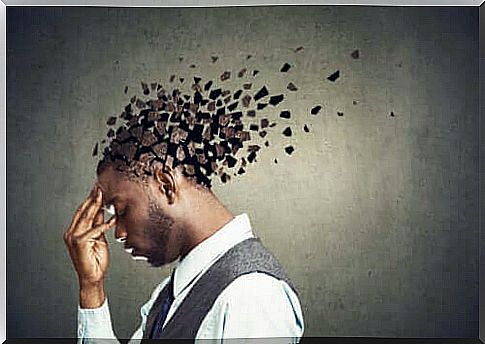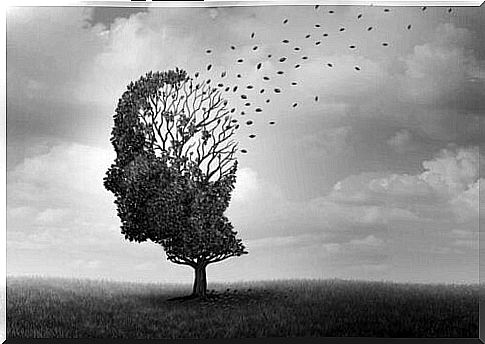An Overview Of The Different Types Of Amnesia

There are different classifications and types of amnesia. It is a disorder characterized by a person’s partial or complete loss of memory. According to diagnostic books, it is estimated that dissociative amnesia – a specific form – is present in up to 2.6% of the population.
There are two primary ways to categorize the different types of amnesia. The first refers to the chronology of memory loss, that is, the type of information that the patient is unable to remember. The other groups them together based on their etiology or in other words the underlying cause of the disease.
In general , the origin of amnesia can be organic or functional. Some of the most common triggers are, for example, brain damage and the use of certain drugs.
Types of amnesia based on their chronology
Overall, we can distinguish between two types of amnesia: retrograde and anterograde amnesia. It is important to note that a patient can experience both at the same time, which means that they are two complimentary diseases.
At the same time, this categorization does not refer to the causes but the symptoms. The Memory Health Check website gives us definitions of these terms.
Anterograd amnesia
In this case, the brain does not transmit new events to the patient’s long-term memory. This means that the person only remembers what happened before their amnesia took place.
This type of amnesia involves a severe loss of autonomy in everyday life, since lack of ability to create new memories and experiences causes various disorders from an emotional point of view. At the same time, it also involves health risks in the form of accidents. For example, you can forget that you have turned on the stove.
Types of amnesia: Retrograde amnesia
Here we will look at the second type, because in the case of retrograde amnesia , the patient does not remember anything that took place before the occurrence of this disease. According to the International University of Valencia, it is possible to forget all the information one has collected through life before a brain injury or event.

Types of amnesia based on their etiology
On the other hand, the Cleveland Clinic indicates that we can also categorize types of amnesia based on their etiology. That is, according to the cause that triggered the disease. Let’s look at each of them in detail.
Post-traumatic amnesia
According to neurological studies , a traumatic brain injury (TBI) is one of the most common causes of disability and mortality in the world. Data show that there are more than 2.5 million hospitalizations for this type of injury in the United States, which is equivalent to 16% of hospitalizations due to falls or strokes.
Post-traumatic amnesia occurs as a result of injuries that cause brain damage but do not penetrate the skull. This type of disorder is usually accompanied by loss of consciousness and even coma. Fortunately, memory loss is temporary in most cases.
Types of amnesia: Transient global amnesia (TGA)
According to the Mayo Clinic , transient global amnesia is a temporary memory loss that cannot be attributed to the most common neurological diseases such as epilepsy or stroke. The incidence of this disease – that is, the number of new cases in one place – is between 2.9 to 10 cases per 100,000 people.
Experts therefore consider it a very rare disorder. Although scientists are still not aware of the trigger of this disorder, they suspect a link with the presence of migraines and diseases of blood vessels.
Amnesia of the midbrain
As the name suggests, what characterizes this type of amnesia are lesions of the midbrain. The primary functions of this structure are to connect nerves to the endocrine system as well as to control the release of certain glands.
An example of this type of disorder is Korsakoff syndrome. In this particular case, what determines the loss of memory and abilities is the lack of absorption of vitamins – generally vitamin B1 – due to damage to the gastrointestinal tract from a large intake of alcohol.
Types of amnesia: Amnesia in childhood
Amnesia in banishment is common to all people as it refers to the inability of adults to remember the first 3-4 years of their childhood. Research indicates that the limit of this memory is variable and is influenced by both individual and cultural factors.
Amnesia caused by Alzheimer’s
Although we are still not aware of all the causes of Alzheimer’s – experts even suspect metabolic diseases – associations such as Elalzheimer.com point out that amnesia is one of the first symptoms of this disease. This disorder causes patients to lose both short-term memory and memories of immediate events.
Drug-induced amnesia
According to San Diego Hospital, some drugs such as flunitrazepam produce anterograde amnesia. As we have mentioned above, this makes it impossible for the patient to remember everything that happened when they were under the influence of the drug.
Flunitrazepam is unfortunately known as a remedy for rape. This is because it is usually the substance that assailants get in women’s drinks so they do not remember what happened and do not know how to identify the assailant’s face.
Dissociative amnesia
In this case, we are faced with a type of amnesia, which is an unconscious defense mechanism. Patients suffering from dissociative amnesia block personal information involving a traumatic event.
According to the website of MSD manuals, these holes in the memory can range from a few minutes to entire decades of life. Hypnosis and drug-influenced conversations can help patients remember the traits of the traumatic events.
Paramnesia
According to the Medical Dictionary website, paramnesia is a change in memory that involves distortion of memories. These fictitious facts replace the real situation, which cannot be remembered.
This type of amnesia appears quite frequently in cases of chronic alcoholism and organic syndromes in the brain. We understand them as deja vú and jamais vú.
The first term refers to a situation where the person feels a new experience as if they had experienced it before. On the other hand, it describes the latter phenomenon when a person does not remember having experienced anything before.

When should you talk to a doctor?
After a severe concussion that causes loss of consciousness, even if it is bare for a few seconds, a visit to the emergency room is mandatory. Some brain injuries do not manifest themselves immediately, so one should go to a doctor as soon as possible.
At the same time, it is necessary to emphasize that the loss of short-term memory is common among the general population. We live at a high pace and sometimes anxiety disorders make us feel disoriented and confused. There is therefore no need to worry if one does not remember everything completely.
The different types of amnesia are innumerable and varied
As you can see, although it is a disorder with a simple definition, there are many different types of amnesia depending on the chronology and the cause. Generally, amnesia occurs after a brain injury and the memory loss is temporary.
It is common to forget things in a society full of stimuli. When a person forgets essential details in their daily life, feels confused in their own home or is unable to identify their location in a physical space, it is important to go to the doctor.









